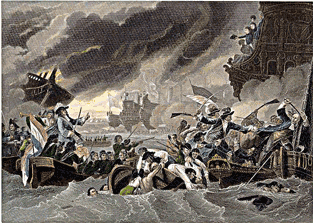The War of the
Grand Alliance
1688-1697

1688–97, war between France and a coalition of European powers,
known as the League of Augsburg (and, after 1689, as the Grand Alliance).
Louis XIV of France took advantage of the absence of Emperor Leopold
I on a campaign against the Turks and of the promised support of James
II of England to invade the empire and devastate (1689) the Palatinate.
The revolution in England overthrew James, and William, prince of Orange,
became William III of England (1688–89). In an attempt to keep
William from leading troops to the Continent, Louis supported a counter
revolution in Ireland but was frustrated at the battle of the Boyne
(1690). The naval war, of which the first major battle was the French
victory at Beachy Head (1690), was practically ended by the English
victory of La Hogue (1692). On land, however, Louis and Vauban took
Namur (1692); Marshal Luxembourg was victorious at Fleurus (1690) over
the Dutch and at Steenkerke (1692) and Neerwinden (1693) over William
III; and the duke of Savoy was defeated at Marsaglia by Catinat (1693),
while another French army entered Catalonia. The exhaustion of the belligerents
and the defection of Savoy from the Grand Alliance (1696) finally led
to the Treaty of Ryswick. This war was known on the American continent
as King William’s War.
1697, the pact that ended
the War of the Grand Alliance. Its signers were France on one side and
England, Spain, and the Netherlands on the other. It was a setback for
Louis XIV, who kept Strasbourg but lost most other conquests made after
1679. Commercial concessions were granted the Dutch, the independence
of Savoy was recognized, and William III was acknowledged king of England.
King
William's War
1689-1697
The European phase of the war broke out first when WIlliam III joined
the League of Augsburg and the Netherlands (Grand Alliance, 12 May 1689)
to resist Louis XIV's invasion of the Rhenish Palatinate (25 Sept. 1688).
In America hostilities broke out between the English and French on Hudson
Bay and between the Iroquois and the French in the area from the Mohawk
to the St. Lawrence. The French under Frontenac (returned as governor,
Oct. 1689) struck with their Native American allies along the northern
frontier, with raids on Schenectady (9 Feb. 1690), Salmon Falls, N.H.
(27 Mar.), and Falmouth (Portland, Me., 31 July), followed by Abenaki
raids on Wells, Me. (21 June 1692), Durham N.H. (23 June 1694), and
Haverhill, Mass. (15 Mar. 1697). On the western frontier Frontenac attacked
the Iroquois (1693-1696). On the part of the English the only successful
colonial operation was the seizure of Port Royal (11 May 1690) by an
expedition of Massachusetts troops under Sir William Phips (1651-1695),
recaptured a year later by the French. The 3-pronged attack on the St.
Lawrence projected at the Albany Conference ousted the English from
their Hudson Bay posts at the mouths of the Severn (1690) and the Hayes
(1694), but the English recaptured the James Bay area (1693). The inconclusive
Treaty of Ryswick (30 Sept. 1697) restored the status quo ante in the
colonies and turned the Hudson Bay dispute over to commissioners, who
reached no agreement (1699).
King William's War (1689-1697)
was the first of what came to be known in America as the French and
Indian wars. In fact, the French and Indian Wars were a series of colonial
wars between Great Britain and France that lasted three-quarters of
a century. Hostilities in King William's War begain in 1690, when in
the course of a few months Schenectady, N.Y., was burned by the French
and Indians, and colonial English forces launched attacks on Port Royal
(now Annapolis Royal), Nova Scotia, and on Quebec. Despite further raids
by the French and Indians, the war ended in a stalemate. The Treaty
of Ryswick, by which were ended the war and its European counterpart,
the War of the Grand Alliance restored all colonial possessions to their
prewar status.
French and Indian forces
from Montreal attacked and burned Schenectady, N.Y.
The city of Quebec was
attacked by English forces in the first major military operation of
King William's War. They were repulsed by the French under Louis de
Baude, comte de Palluau et de Frontenac
King William's War was
ended by the Treaty of Ryswick. From the standpoint of the American
colonies, the war was completely pointless. Both French and English
forces won a number of engagements and managed to occupy part of each
other's territory. However, the treaty restored all possessions to their
prewar status.
Three treaties were signed at Ryswick,
September 20, 1697, securing peace between Louis XIV of France on the
one side, and on the other William III of Orange (acting for Great Britain),
the United Provinces of the Low Countries, and Charles II of Spain.
The following select articles are taken from the first of these treaties.
--------------------------------------------------------------------------------
TREATY OF PEACE BETWEEN WILLIAM
III, KING OF GREAT BRITAIN, AND LOUIS XIV, THE KING OF FRANCE
I.
That there be an universal and perpetual peace and a true and sincere
friendship, between the Most Serene and Mighty Prince William III King
of Great Britain, and the Most Serene and Mighty Prince Louis XIV the
Most Christian King, their heirs and successors, and between the Kingdoms,
states and subjects of both; and that the same be so sincerely and inviolably
observed and kept, that the one shall promote the interest, honour and
advantage of the other; and that on both sides a faithful neighbourhood,
and true observation of peace and friendship, may daily flourish and
increase.
IV.
And since the Most Christian King was never more desirous of any thing
than that the peace be firm and inviolable, the said King promises and
agrees for himself and his successors, that he will on no account whatsoever
disturb the said King of Great Britain, in the free possession of the
Kingdoms, countries, lands or dominions which he now enjoys; and therefore
engages his honour, upon the faith and word of a king, that he will
not give or afford any assistance, directly or indirectly, to any enemy
or enemies of the said King of Great Britain; and that he will in no
manner whatsoever favour the conspiracies of plots which any Rebels,
or ill-disposed persons, may in any place excite or contrive against
the said King: and for that end promises and engages, that he will not
assist with arms, ammunition, ships, provisions or money, or in any
other way, by sea or land, any person or persons who shall hereafter,
under any pretence whatsoever, disturb or molest the said King of Great
Britain, in the free and full possession of his Kingdoms, countries,
lands and dominions. The King and successors, Kings of Great Britain,
that he will inviolably do and perform the same towards the said Most
Christian King, his Kingdoms, countries, lands and dominions.







